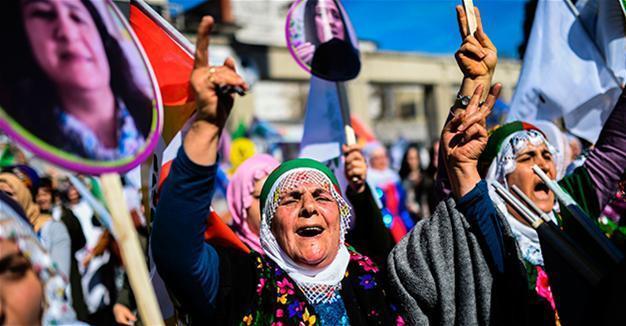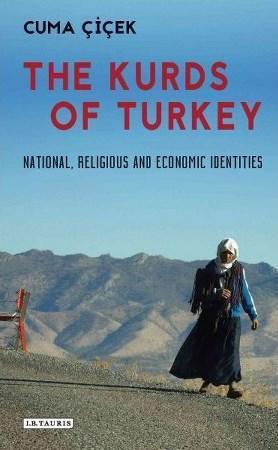The Kurds of Turkey: National, religious and economic identities
William Armstrong - william.armstrong@hdn.com.tr

Women chant slogans and hold pictures of Kurdish-issue focused Peoples' Democratic Party (HDP) co-chair Figen Yüksekdağ, who is arrested pending trial on terror charges, on March 5 in Istanbul. AFP photo
‘The Kurds of Turkey: National, Religious and Economic Identities’ by Cuma Çiçek (IB Tauris, 352 pages, £69)
In recent years news reports have indulged in plenty of loose talk about “the Kurds.” “The Kurds,” we are told, are fighting ISIS. Turkey, it is said, is "at war with the Kurds.” Underlying this media shorthand is an oversimplification imagining a fantasy unity. In reality, “the Kurds” are full of internal fissures just like any other national group.

“The Kurds of Turkey: National, Religious and Economic Identities” by academic Cuma Çiçek is a sophisticated exploration of the multifariousness of Kurds in Turkey. Kurdish nationalism may be at the core of politics in the southeast (when its representatives are not in jail), but the reality is richer and more nuanced than suggested by partisans of all sides – and by many outside observers.
As Çiçek writes, “divisions due to national, religious and class-based dynamics have constituted grave obstacles” for Kurdish groups attempting to establish a unity of purpose. Çiçek navigates a dizzying acronym soup of organizations and parties that bewilder more casual observers. At times the book slips into dry theoretical drudgery but it’s worth wading through that to reach many valuable insights.
Among the fundamental divisions is the sometimes antagonistic relationship between the Kurdish national movement and the Kurdish economic elite. The southeast is Turkey’s least developed region, marked by minimal industrialization and high unemployment. Businesses there struggle to survive in a very difficult landscape. This struggle is complicated by mutual distrust between economic actors and the Kurdish national movement. Kurdish nationalists accuse the Kurdish economic elite of “weakness and state-dependence,” typically viewing it as craven, disorganized, self-seeking, stability-seeking, and lacking national identity. Economic players, charting a perilous course between the Turkish state and the Kurdish national movement, often criticize the latter for being fixated on identity politics at the expense of the economy.
That fissure has a long heritage. Going back to the Ottoman era, traditional Kurdish authorities cooperated with the state based on shared Islamic sentiments as well as patronage relations between the local ruling class and the center. This reproduced a kind of prolonged feudality in the Kurdish region “and prevented – or at least delayed – the emergence of an urbanized and educated Kurdish social class,” Çiçek writes. Since its earliest days in the 1970s, the militant Kurdistan Workers’ Party (PKK) has criticized the landlord class as the enemy of the Kurdish people, violently targeting local aghas, tribal leaders and sheikhs. Unsurprisingly, the schism remains potent today, “a remarkable obstacle to building a Kurdish consensus in Turkey.”
Another important divide is between religiosity and secularism. The Kurdish region is among the most conservative in Turkey, but the Kurdish national movement is marked by a modernist secularist ideology. Tension persists between those who prioritize religion and those who prioritize ethnicity, limiting the Kurdish movement’s capacity to cooperate with the many Kurdish pro-Islamist groups.
Çiçek comments on the Kurdish movement’s “left-wing heritage, highly modernist secular quality, and women’s liberation discourse and mobilization” which “commonly sees religion as an archaic, reactionary phenomenon that limits social emancipation and will be eliminated during the socioeconomic development and modernization process.” According to this perspective, “[religion] is one of the principle instruments used by the Turkish state to undermine the Kurdish national liberation struggle.” This fissure remains live today, with the ruling Justice and Development Party (AKP) and President Erdoğan emphasizing the Islamic brotherhood of Turks and Kurds against the atheistic PKK’s godless immorality. This resonates with many, as the AKP is the only electoral rival to Kurdish national parties across the southeast.
“The Kurds of Turkey” is based on extensive interviews with a broad diversity of actors. But it pays too little attention to the inescapable effect of violence in shifting relations. Turkey’s Kurdish question cannot be seen solely (or even mainly) as a security issue, but that aspect is inescapable. The militarization of parts of the Kurdish national movement is crucial, as is the crackdown of the state security forces. How has that affected balances within Kurdish society? To what extent does violent coercion affect how people view the situation? Where do the village guards employed by the state against the PKK fit in? Also barely addressed is the important factor of local tribal affiliation, which remains potent in parts of the southeast. That is a strange omission in a study examining the fissures within political motivation in the Kurdish-majority southeast.
But on the whole “The Kurds of Turkey” is a stimulating book that deepens the reader’s understanding beyond catch-all terms, illuminating important nuances.
* Follow the Turkey Book Talk podcast via Twitter, iTunes, Stitcher, Podbean, Acast, or Facebook.

 “The Kurds of Turkey: National, Religious and Economic Identities” by academic Cuma Çiçek is a sophisticated exploration of the multifariousness of Kurds in Turkey. Kurdish nationalism may be at the core of politics in the southeast (when its representatives are not in jail), but the reality is richer and more nuanced than suggested by partisans of all sides – and by many outside observers.
“The Kurds of Turkey: National, Religious and Economic Identities” by academic Cuma Çiçek is a sophisticated exploration of the multifariousness of Kurds in Turkey. Kurdish nationalism may be at the core of politics in the southeast (when its representatives are not in jail), but the reality is richer and more nuanced than suggested by partisans of all sides – and by many outside observers.